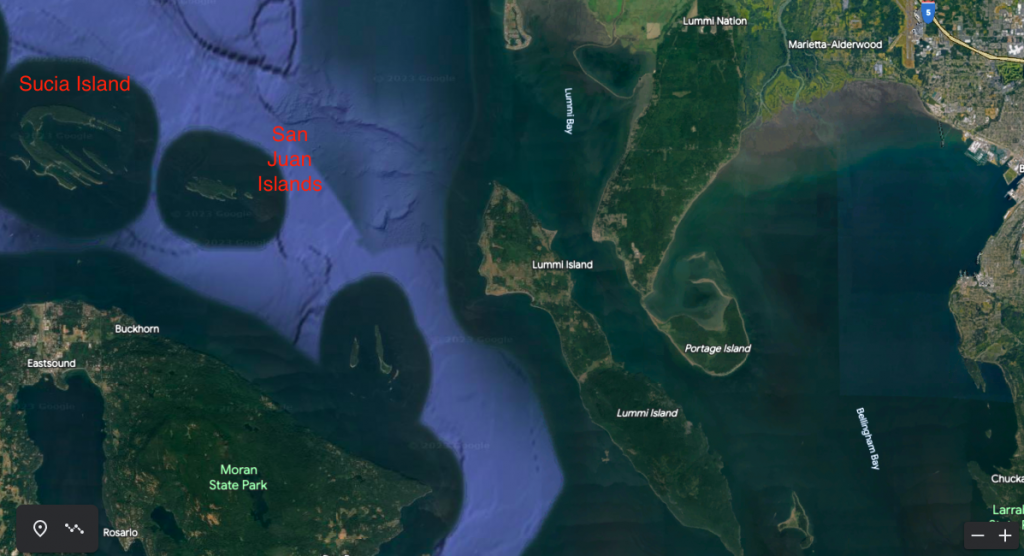Out of many of the Whale Sanctuary’s ongoing projects, one that’s slowly but steadily progressing is the plan to release Toki, an orca in captivity, who bears strong ties with the indigenous Lummi People.
LUMMI NATION: PEOPLE OF THE SEA
The Lummi People, also referred to as the Lhaq’temish, are the original inhabitants of the Puget Sound area in northern Washington and southern British Columbia. They have been in this area for thousands of years. They traveled with the seasons between Point Roberts, Lummi Peninsula, Portage Island, and sites in the San Juan Islands and Sucia Island. Periodically, they returned to their longhouses located on the San Juan Islands, as well as on the present reservation area. The reservation is a land area of 20.996 square miles, which includes the Lummi Peninsula and Portage Island.

Lummi traditional lifestyle consisted of collecting shellfish, hunting game, and fishing for salmon. In fact, their survival and culture are intertwined with the ability to fish for salmon. Unfortunately, this was threatened by the increased presence of fisheries intruding on their waters, which limited their ability to fish.
In 1855, the Treaty of Point Elliot was signed, and the Lummi ceded most of their land in western Washington. In return, they were allocated a reservation that initially covered 15,000 acres or 23,438 square miles. The Lummi, as well as the additional tribes in the Puget Sound region, were paid $150,000 for their lands and $15,000 in relocation expenses. In 2013, this equated to roughly $4.2 million.
The Treaty of Point Elliot federally secured Indigenous fishing rights, but the United States government has since cited other treaties and imposed restrictions on reservations in order to restrict those inherent rights. As previously stated, Lummi culture and survival have always been dependent on their ability to fish. While they have fought against imposed regulations through methods like protest fish-ins in the 1960s, the US government continues to subvert the Lummi Nation’s ability to fish, as they recognize that fishing is a medium for empowerment and connection to their past. However, the Washington Department of Fishing and Wildlife recognizes the traditional Lummi fishing technique of “reef netting” as the best method for selective fishing in saltwater.
THE TALE OF TOKI
Tokitae, or Toki (also known as Lolita) the orca, whose name means “nice day, pretty colors”, belonged in the Salish Sea, which is roughly 35 miles southwest of the Lummi Nation Reservation. About two years ago, the Lummi Nation of the Pacific Northwest gave her the name Sk’aliCh’elh-tenaut, indicating that she is a member of the Sk’aliCh’elh family of orcas that occupy the Salish Sea. In Lummi, “orca” is “qwe’lhol’mechen,” or “our relatives under the water.” This shows the deep familial connection to Toki, as well as the devotion to bringing her home.
In 1970, she was abducted from her family in the waters of the San Juan Islands and has since then been living captive in a concrete tank at the Miami Seaquarium and used for performances. She is the only one still alive among 7 baby orcas taken at the same time.
There had been constant efforts from the Lummi people and organizations such as Friends of Toki and the Whale Sanctuary Project to advocate for her release back to her homeland, but it had faced strong opposition from the Seaquarium, and even requests for allowing teams of independent veterinarians to examine her had been declined. Luckily, with a change in ownership, the Seaquarium announced her retirement in March 2022 and is now “100 percent committed” to efforts to release her back home to the Pacific Northwest, where her relatives, including the 93-year-old whale believed to be her mother, still reside.
Click HERE to read more about Toki, and the efforts countless people have dedicated to release her back into the wild.